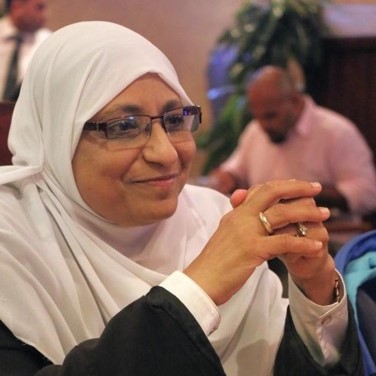Date of 1st day in prison: 01/11/2018 Released: No Restrictions: None |
Hoda Abdel Moneim is a human rights lawyer who worked on documenting human rights abuses, including incidents of enforced disappearance. She formerly served on Egypt’s National Council for Human Rights in 2012-2013. Ms Abdel Moneim was also a spokesperson for the Women’s Revolutionary Coalition of Egypt, which opposed to the removal of former President Mohamed Morsi in 2013. The Council of Bars and Law Societies of Europe (CCBE) granted its 2020 Human Rights Award to Hoda Abdel Moneim and six other Egyptian lawyers.
She was arrested at her house in Nasr City (Cairo) in the middle of the night on 1 November 2018 by Egyptian authorities without being informed of the reasons of her arrest. She was kept under enforced disappearance until 21 November 2018. Ms Abdel Moneim was held in pre-trial detention in an unknown location until she was transferred to Qanater prison in January 2019 and remained under pre-trial detention, in violation of the 2-year legal limit. The Supreme State Security Prosecution referred her case to trial before the Emergency State Security Criminal Court on 23 August 2021.
During her detention, her health condition seriously degraded. She is diagnosed with deep vein thrombosis which requires regular medication. In February 2020, she had a heart attack and was transferred to the prison’s hospital. She later appeared in front of the state security prosecutor in a wheelchair. In November 2020 she was diagnosed with kidney diseases, but a request to see a specialist was refused. Ms Abdel Moneim is in urgent need of medical care to address her heart disease, but the prison authorities refuse to transfer her to an external hospital.
The European Parliament has repeatedly called for Ms Abdel Moneim’s immediate release in its recent resolutions on Egypt (24 November 2022, 18 December 2020, 24 October 2019). UN Special Rapporteur Mary Lawlor also raised her case.
On 5 March 2023, Ms Abdel Moneim was sentenced to 5 years in prison and 5 additional 5 years on probationary detention during which she will be required to spend every night at a police station. She was convicted as part of the “Egyptian Coordination for Human Rights and Freedoms” case alongside 13 other defendants on bogus charges stemming from their human rights work. UN Special Rapporteur Mary Lawlor expressed her concerns over this verdict and called for the defendants’ immediate release.
In June 2023, Ms Abdel Moneim was transferred from Al Qanater to 10th of Ramadan prison in Sharqia governorate. On 26 June, she was allowed a 30-minute visit from her husband and her daughter for the first time in nearly a year. She told them the conditions were better, but that she felt more isolated, which is impacting her mental health. Her health has further deteriorated, and she has developed inflammation of the nerves (peripheral neuropathy) which causes her sharp pain, numbness and the sensation of electric currents in different parts of her body. Prison authorities continue to refuse her adequate healthcare, including transfer to an outside hospital if necessary for diagnosis and treatment. The Administrative Judicial Court, handling the case, postponed the session requesting Ms Abdel Moneim’s health-based release for another four months.
On 13 July 2023, her family tried to visit her again, but the prison authorities did not allow them without providing a reason.
On 1 November 2023, the Supreme State Security Prosecution has initiated a new investigation recycling Ms Abdel Moneim under a new case (no. 730 of 2020) on similar charges to those she was tried for in the earlier case (no. 1152 of 2018) of joining and financing a terrorist group. At the end of that day, she was supposed to end the 5-year imprisonment term.

